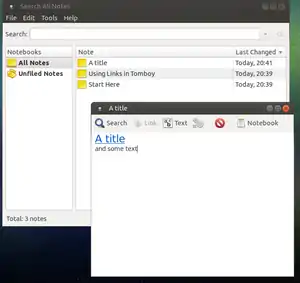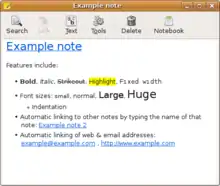Tomboy (software)
Tomboy is a free and open-source desktop note-taking application written for Unix-like (including Mac OS X and Linux) and Microsoft Windows operating systems,[1] written in C# using Gtk. Tomboy is part of the GNOME desktop environment personal information management software and achieved widespread popularity as the default note taking application in early Ubuntu releases.[2] As Ubuntu changed over time and its cloud synchronization software Ubuntu One came and went, Tomboy inspired various forks and clones. Its interface is a notepad with a wiki-like linking system to connect notes together. Words in the note body that match existing note titles become hyperlinks automatically, making it simple to construct a personal wiki. For example, repeated references to favorite artists would be automatically highlighted in notes containing their names. As of release 1.6 (2010) it supports text entries and hyperlinks to the World Wide Web, but not graphic image linking or embedding.
 | |
 Tomboy 1.15.4 running under Ubuntu MATE | |
| Developer(s) | Alex Graveley and Tomboy Contributors |
|---|---|
| Stable release | 1.15.9
/ July 16, 2017 |
| Preview release | 1.15.7-rc1
/ January 28, 2017 |
| Repository | |
| Written in | C# |
| Operating system | Cross-platform |
| Platform | Mono, GTK+ |
| Type | Note-taking application |
| License | GNU LGPL |
| Website | github |

Features
Some of the editing features supported:
- Text highlighting
- Inline spell checking using GtkSpell
- Automatic hyperlinking of Web and email addresses
- Undo/redo
- Font styling and sizing
- Bulleted lists
- Note synchronization over SSH, WebDAV, Ubuntu One, or the Tomboy REST API [3] that is implemented by several server applications
Plugins
Tomboy supports several plugins, including:
Ports
- Conboy is a Tomboy port to the Maemo platform written in the C language[4][5]
- Gnote is a conversion of the Tomboy code to the C++ language using the GTK toolkit
- libktomgirl is a platform independent library which allows software to read and write the Tomboy File Format [6]
- tomboy-ng is a port to pascal [7] and the currently maintained version, ported to circumvent license issues with mono
- Tomdroid is an effort to produce a Tomboy client for the Android mobile platform.[8] "The goal is to be file format compatible and be able to sync notes with tomboy"[9]
See also
References
- "Tomboy: Simple note taking". June 25, 2009. Retrieved July 5, 2009.
- http://www.iheartubuntu.com/2014/10/tomboy-original-note-app.html
- "Tomboy Web, A RESTful API for Tomboy Note Synchronization". 2014-08-23. Retrieved 2014-09-13.
- Conboy
- "garage: Conboy - Note Taking Application: Project Info". September 16, 2009. Retrieved September 16, 2009.
- "libktomgirl: An implementation of the Tomboy File Format in C++". October 15, 2013. Retrieved October 15, 2013.
- https://github.com/tomboy-notes/tomboy-ng
- Tomdroid
- "Tomboy Notes on Android: Olivier Bilodeau Releases Tomdroid 0.1.0". April 21, 2009. Retrieved January 3, 2010.
